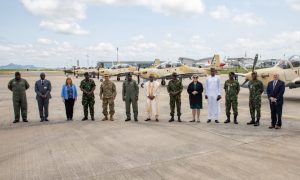Leshi Adebayo

Nigerian Air Force (NAF), on Monday, inducted the A-29 Super Tucano Aircraft into its inventory.
The ceremony had in attendance, the Minister Of Defence, Bashir Magashi and the U.S Department of Defense leaders.
According to a statement by the United States (US) Africa Command, the Super Tucano induction is the latest of multiple significant engagements between U.S. Africa Command, its components, and Nigerian counterparts.
Speaking at the ceremony, Gen. Jeff Harrigan, U.S. Air Forces in Europe-Air Forces Africa commander said, “The Nigerian Air Force is one of our key partners that plays a critical role in furthering regional security and stability. “This ceremony symbolizes the strength of our unique partnership and underscores the value of training and working together.”

He said the Super Tucanos were the impetus for significant deepening of training and professional relationships; the aircraft will assist the Nigerian Air Force in their fight against violent extremist organizations especially the Islamic State West Africa Province.
“The aircraft will assist the Nigerian Air Force in their fight against violent extremist organizations including the Islamic State West Africa Province. The joint structure of air-to-ground integration also supports Nigerian Army and Navy operations. Nigeria purchased the A-29s through the Foreign Military Sales program, which follows the Department of Defense’s “Total Package Approach” model and includes spare parts for several years of operation, contract logistics support, munitions, and a multi-year construction project to improve Kainji Air Base infrastructure,” the statement added.
Harrigian and U.S. Ambassador to Nigeria Mary Beth Leonard spoke to media about how this platform will help improve Nigerian Air Force capabilities, as well as increase training and integration opportunities between Nigerian and U.S. troops.
Harrigan said, “The A-29 is a prime tool to help Nigeria combat violent extremism and is vital to sustained deterrence. The total package deal—aircrew and maintainer training, precision-guided weapon delivery, and more—highlights our enduring partnership with the Nigerian Air Force and our commitment to enabling their successes where we can.”

A total of 64 pilots and maintainers altogether, from the Nigerian Air Force trained to U.S. standards alongside U.S. Air Force’s 81st Fighter Squadron at Moody Air Base in Georgia, USA.
Being part of program’s benefits, the U.S. Army Corps of Engineers is providing $36.1M in infrastructure support to the A-29s’ home base, Kainji Air Base along with other supplies. The USACE has stationed a project engineer at Kainji for constant maintenance and assistance.




